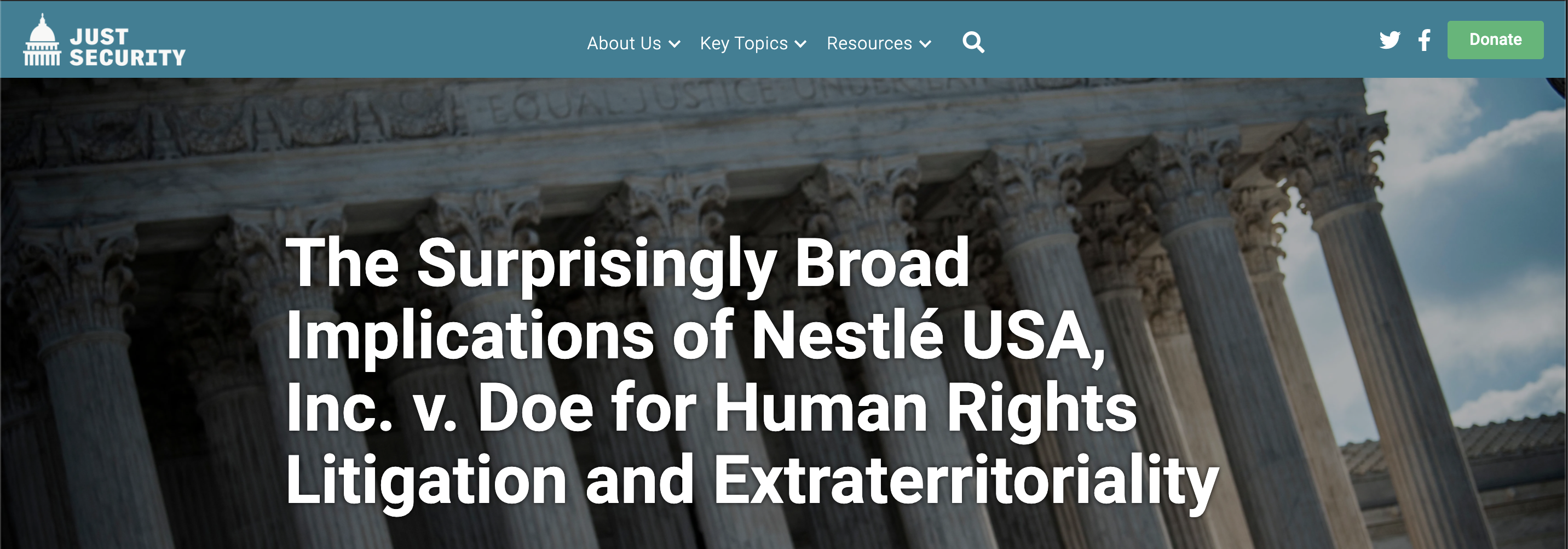
The Surprisingly Broad Implications of Nestlé USA, Inc. v. Doe for Human Rights Litigation and Extraterritoriality
In Nestlé USA, Inc. v. Doe, the U.S. Supreme Court took up the question of corporate liability for human rights violations under the Alien Tort Statute (ATS) for the third time. The Court again failed to resolve the question, holding instead that application of the ATS cause of action would be impermissibly extraterritorial in this case because nearly all the defendants’ relevant conduct occurred in Ivory Coast. At first glance, this holding appears narrow, which is no doubt why it attracted the votes of eight Justices. But the decision has potentially broad implications for ATS suits against individuals and for the extraterritorial application of federal statutes in other areas. This article will briefly discuss the questions of corporate liability and limiting the ATS cause of action before exploring the Court’s extraterritoriality holding and its potentially dramatic implications.
Background
The defendants are U.S. companies that buy cocoa from Ivory Coast. The plaintiffs are individuals from Mali who were trafficked to Ivory Coast as child slaves to work on cocoa farms. Plaintiffs alleged that defendants aided and abetted their slavery by providing the farms that held them with technical and financial resources despite knowing or having reason to know that the farms were using children as slaves. Plaintiffs alleged that the defendants made all their major operational decisions from the United States.
The ATS is a jurisdictional provision that was part of the First Judiciary Act of 1789. As codified today, it gives federal district courts jurisdiction over “any civil action by an alien for a tort only, committed in violation of the law of nations or a treaty of the United States.” In 1980, the Second Circuit held in Filartiga v. Pena-Irala, 630 F.2d 876 (2d Cir. 1980), that non-U.S. citizen plaintiffs could use the ATS to sue a foreign police inspector who had come to the United States to recover damages for torture that occurred abroad, reasoning that the plaintiffs were “aliens,” that torture is a tort, and that torture violates modern customary international law.
In Sosa v. Alvarez-Machain, 542 U.S. 692 (2004), the Supreme Court rejected arguments that a statutory cause of action should be required for claims under the ATS and that claims should be limited to the three violations of the law of nations that the First Congress had in mind in 1789 (violations of safe-conducts, infringement of the rights of ambassadors, and piracy). The Court recognized an implied, federal-common-law cause of action for violations of modern international law that are as generally accepted and specifically defined as the three historical paradigms, although the Court found that Alvarez-Machain’s claims of arbitrary detention did not meet that standard.
In 2010, the Second Circuit held in Kiobel v. Royal Dutch Petroleum Co., 621 F.3d 111 (2d Cir. 2010), that corporations could never be sued under the ATS because corporate liability for human rights violations did not meet the Sosa standard. The Supreme Court granted review on the corporate liability question, but after reargument the Court declined to answer the question. Instead, the Court applied the presumption against extraterritoriality to the ATS cause of action, holding that ATS claims must “touch and concern the territory of the United States . . . with sufficient force to displace the presumption against extraterritorial application” and that “mere corporate presence” in the United States is insufficient. Kiobel v. Royal Dutch Petroleum Co., 569 U.S. 108, 124-25 (2013). The Court tried again to answer the corporate liability question in Jesner v. Arab Bank, PLC, 138 S. Ct. 1386 (2018). Again, it failed, holding only that the ATS cause of action does not extend to foreign corporations. Id. at 1407.
The Nestlé case presented the Court with a third opportunity to decide the corporate liability question because the defendants were U.S. corporations not protected by Jesner. But once again, the Court disposed of the case on other grounds. Justice Thomas concluded in Part II of his opinion (joined by every member of the Court except Justice Alito) that applying the ATS cause of action would be impermissibly extraterritorial because the plaintiffs had not alleged sufficient relevant conduct in the United States. Justice Thomas went on in Part III to propose that the ATS cause of action should be limited to the three historical paradigms that the First Congress had in mind, but he was joined only by Justices Gorsuch and Kavanaugh. Justice Sotomayor (joined by Justices Breyer and Kagan), agreed with Justice Thomas about extraterritoriality but disagreed about limiting the ATS cause of action. She also reiterated her view that the ATS cause of action should extend to corporations. Justices Gorsuch and Alito agreed with Justice Sotomayor that there was no basis for limiting the ATS cause of action to natural persons (which, yes, makes five Justices on that point of law). Justice Gorsuch (joined by Justice Kavanaugh), however, would have overruled Sosa, whereas Justice Alito would not have reached the extraterritoriality question before deciding other issues he though should be preliminary.
Read the entire article here.
